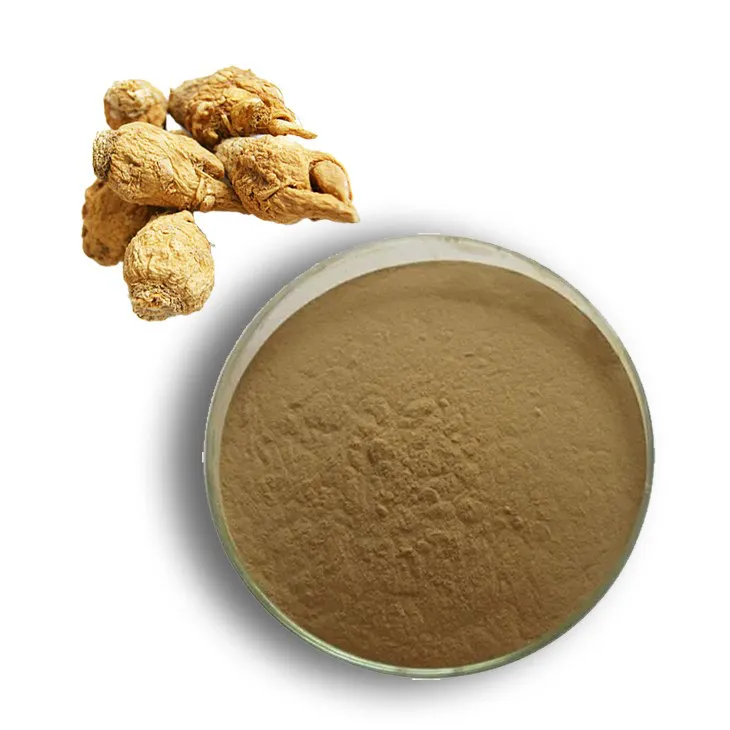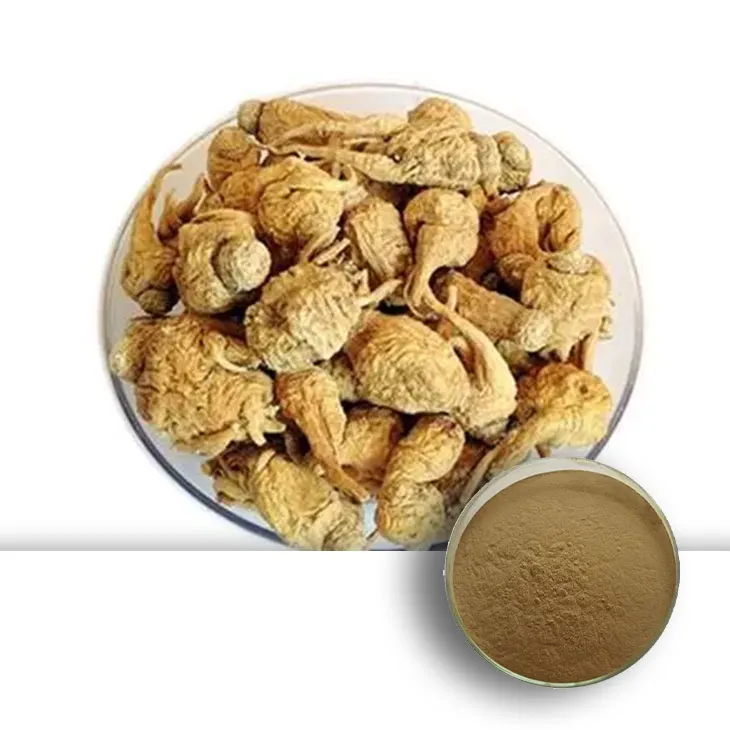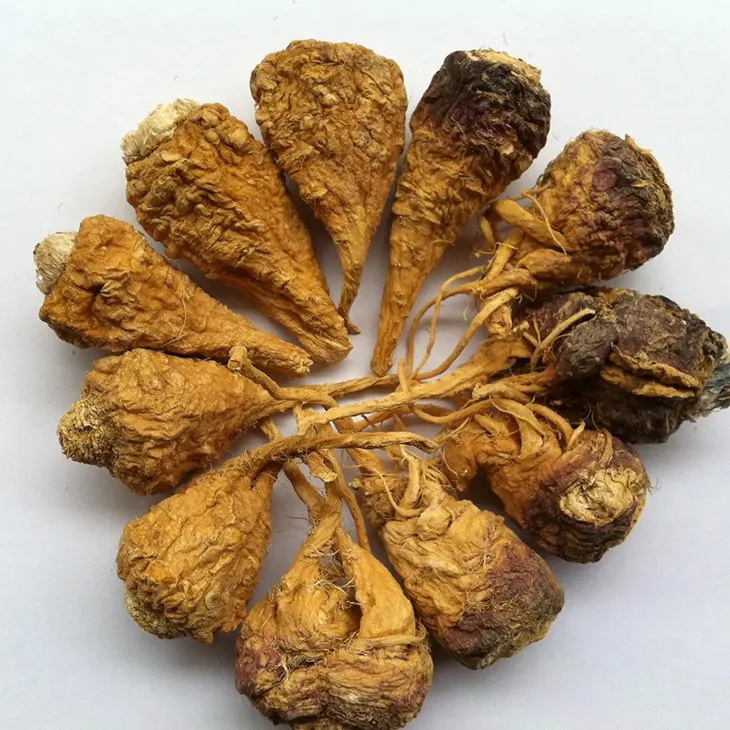- 0086-571-85302990
- sales@greenskybio.com
Manufacturer of Organic Maca Extract Powder.
2024-12-02

Introduction to Organic Maca Extract Powder
Organic Maca Extract powder has been making waves in a variety of industries in recent years. This is primarily due to its impressive array of health benefits. Maca, a plant native to the Andean highlands, has been used for centuries in traditional medicine. The extraction of its key components into a powder form has made it more accessible and versatile for modern applications.

The Role of a High - Quality Manufacturer
A high - quality manufacturer of organic Maca Extract powder is indispensable in the supply chain. They are responsible for ensuring that the end - product is not only safe but also retains the maximum nutritional and beneficial properties of the Maca root.

Sourcing of Organic Maca Roots
Geographical Origin
The best organic Maca roots are often sourced from the Andean highlands, the native habitat of Maca. This region provides the ideal environmental conditions for Maca to grow, with its unique altitude, soil composition, and climate. Manufacturers that source from this area can ensure the authenticity and purity of their raw materials.
Quality of Sourcing
When sourcing Maca roots, manufacturers need to be extremely vigilant. They must ensure that the roots are organically grown, free from pesticides, herbicides, and other contaminants. This involves working closely with local farmers who follow strict organic farming practices. Certifications such as USDA Organic or EU Organic are often sought after to guarantee the quality of the sourced Maca roots.

Advanced Extraction Techniques
Preserving Active Compounds
Manufacturers use advanced extraction techniques to preserve the active compounds in Maca, such as macamides and macaenes. These compounds are believed to be responsible for many of Maca's health benefits. Supercritical fluid extraction is one such technique that is often favored. It uses a fluid, typically carbon dioxide, under high - pressure and - temperature conditions to extract the desired compounds without using harmful solvents. This results in a purer extract with a higher concentration of active ingredients.
Innovation in Extraction
Continuous research and development in extraction techniques are also a hallmark of a good manufacturer. They may explore new methods or combinations of methods to further improve the extraction efficiency and the quality of the final product. For example, some manufacturers are experimenting with enzymatic extraction methods, which can be more targeted in breaking down the Maca root to release the active compounds while minimizing the degradation of other beneficial components.
Quality Control Measures
Raw Material Inspection
Quality control begins at the very start with the inspection of the raw Maca roots. Manufacturers must check for any signs of damage, disease, or contamination. They also verify the authenticity of the organic status through proper documentation and testing. This may involve laboratory analysis to detect the presence of any prohibited substances.
During the Extraction Process
Throughout the extraction process, strict control of parameters is crucial. This includes monitoring the temperature, pressure, and extraction time in the case of techniques like supercritical fluid extraction. Any deviation from the optimal conditions could lead to a lower - quality extract. Manufacturers also need to ensure the proper handling and storage of intermediate products during the extraction process to prevent spoilage or degradation.
Final Product Testing
Before the organic Maca extract powder is packaged and shipped, it undergoes comprehensive final product testing. This includes tests for potency, purity, and stability. The powder must meet strict quality standards in terms of its active compound content, as well as being free from harmful substances such as heavy metals, microbial contaminants, and residual solvents. Only products that pass all these tests are released to the market.
Sustainability and Fair - Trade Practices
Environmental Sustainability
A reliable manufacturer of organic Maca extract powder is committed to environmental sustainability. Since Maca is sourced from the Andean highlands, which are fragile ecosystems, manufacturers need to ensure that their sourcing and production processes do not cause harm to the environment. This may involve promoting sustainable farming practices among local farmers, such as soil conservation, water management, and biodiversity protection.
Fair - Trade with Local Farmers
Manufacturers also focus on fair - trade practices with local farmers. Maca farming is often a major source of income for local communities in the Andean region. By engaging in fair - trade, manufacturers ensure that farmers receive a fair price for their Maca roots. This not only helps to improve the economic well - being of the farming communities but also encourages them to continue growing Maca organically. Fair - trade initiatives may also include providing technical support and training to farmers to improve the quality and yield of their Maca crops.
Applications in Different Industries
Dietary Supplement Industry
One of the primary applications of organic Maca extract powder is in the dietary supplement industry. It is often formulated into capsules, tablets, or powders that are sold as dietary supplements. Consumers take these products to boost their energy, improve their mood, enhance fertility, and support overall well - being. The powder's rich nutrient profile, including vitamins, minerals, and amino acids, makes it a popular ingredient in these supplements.
Functional Food Industry
Organic Maca extract powder is also finding its way into the functional food industry. It can be added to a variety of food products such as energy bars, smoothies, and breakfast cereals. This allows consumers to incorporate the health benefits of Maca into their daily diet in a more convenient and palatable way. Manufacturers in this industry are constantly exploring new ways to incorporate Maca extract powder into different food formulations without sacrificing taste or texture.
Cosmetic Industry
In the cosmetic industry, organic Maca extract powder is used for its potential skin - enhancing properties. It may be included in skincare products such as creams, lotions, and masks. Maca is believed to have antioxidant and anti - aging properties, which can help to protect the skin from environmental damage, reduce wrinkles, and improve skin tone. Cosmetic manufacturers are researching the optimal formulations to harness these benefits effectively.
Conclusion
In conclusion, a high - quality manufacturer of organic Maca extract powder is a key player in the supply chain that bridges the gap between the traditional use of Maca in the Andean region and its modern applications in various industries. Through careful sourcing, advanced extraction techniques, strict quality control, and a commitment to sustainability and fair - trade, these manufacturers are able to produce a product that is not only beneficial for consumers but also supports the growth and well - being of the Maca - growing communities. As the demand for organic Maca extract powder continues to grow, it is essential that manufacturers uphold these high standards to ensure the long - term viability and success of this valuable product.
FAQ:
What are the main health benefits of organic Maca extract powder?
Organic Maca extract powder has several health benefits. It is known to boost energy levels, improve sexual function, enhance fertility, and help with hormonal balance. It may also aid in reducing stress and improving mood due to its adaptogenic properties.
How does a manufacturer ensure the quality of organic Maca extract powder?
Manufacturers ensure quality through various means. They start by sourcing the finest organic Maca roots, usually from the Andean highlands. Then, strict quality control measures are applied at every stage of the manufacturing process. This includes checking the purity of raw materials, maintaining proper extraction conditions, and accurately formulating the final powder product.
What are macamides and macaenes?
Macamides and macaenes are active compounds found in Maca. These compounds are important as they are believed to contribute to many of the health benefits associated with Maca extract powder, such as its effects on energy, sexual function, and hormonal balance.
Why is sustainability important for organic Maca extract powder manufacturers?
Sustainability is crucial for these manufacturers. By promoting fair - trade practices with local farmers, they support the Maca - growing communities. This not only helps in the long - term availability of Maca roots but also ensures the economic well - being of the farmers in the Andean highlands where Maca is native.
In which industries are organic Maca extract powder products used?
Organic Maca extract powder products are used in several industries. They are widely used in the dietary supplement industry for their health - promoting properties. In the functional food industry, they are added to products to enhance their nutritional value. Additionally, they are also used in the cosmetic industry, potentially for skin - improving benefits.
Related literature
- The Bioactive Compounds in Maca: macamides and macaenes"
- "Organic Maca: Sourcing and Manufacturing for Quality"
- "Sustainability in Maca Production: A Manufacturer's Perspective"
- ▶ Hesperidin
- ▶ citrus bioflavonoids
- ▶ plant extract
- ▶ lycopene
- ▶ Diosmin
- ▶ Grape seed extract
- ▶ Sea buckthorn Juice Powder
- ▶ Beetroot powder
- ▶ Hops Extract
- ▶ Artichoke Extract
- ▶ Reishi mushroom extract
- ▶ Astaxanthin
- ▶ Green Tea Extract
- ▶ Curcumin Extract
- ▶ Horse Chestnut Extract
- ▶ Other Problems
- ▶ Boswellia Serrata Extract
- ▶ Resveratrol Extract
- ▶ Marigold Extract
- ▶ Grape Leaf Extract
- ▶ blog3
- ▶ blog4
-
The best sea - buckthorn oil on the market.
2024-12-02
-
The Best Avocado Extract Powder in 2024.
2024-12-02
-
The highest - quality Chaste Berry Extract.
2024-12-02
-
100% Pure Organic Garcinia Cambogia Extract.
2024-12-02
-
Black Rice Extract
2024-12-02
-
Saponin Extract
2024-12-02
-
Phellodendron Extract
2024-12-02
-
Bayberry Extract
2024-12-02
-
Wheat Germ Extract
2024-12-02
-
Rose Hip Extract
2024-12-02
-
Astaxanthin
2024-12-02
-
Curcumin Extract
2024-12-02
-
Tinospora cordifolia extract
2024-12-02
-
Pueraria Lobata Extract
2024-12-02





















